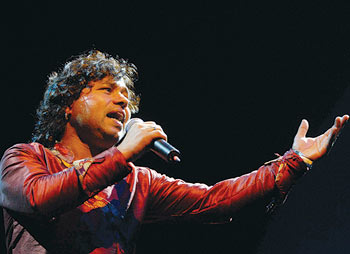
Singer and composer Kailash Kher is on the road, performing across America with his band Kailasa. He spoke at length to Arthur J Pais about his meteoric rise in the Indian music industry in less than a decade and his success outside the movies -- and also how his music is getting international attention.
It has been a busy year for you.I can't complain [chuckles]. Our third album Chaandan Mein is out, and we have performed a hat trick. Kailasa, Jhoomo Re and Chaandan Mein are great hits. Critics have welcomed each of the albums and that is heartening.
And you have a record deal with an American company.
Cumbancha Records, which specialises in Latin, Afro-Cuban and other genres of world music and markets this music to the world, is producing our Yatra (Nomadic Souls). This will be the first international album for my band, Kailasa, and me. The album which will have some of our old and new songs will be released in New York on September 29.
You are also performing in half a dozen cities in America and Canada.
Part of the reason my band and I are here is to create awareness for the album. We are on this tour for three months.
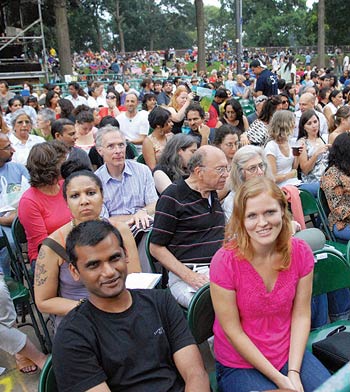
Were you ever concerned you would be pigeon-holed as a singer?
I knew when Kailasa sold so well and became a chartbuster, I could sing a variety of songs without changing my voice. The success of the album also showed me that I did not have to depend on film compositions to make a career out of singing.
I write and compose my own songs, with brothers Paresh and Naresh Kamath enriching the tunes and helping in the arrangements. Each track in the three albums is unique. There is no monotony and no repetition.
What does the huge success of three albums mean to you, professionally?
We have shown again and again that lovely and meaningful music can exist outside the film industry.
Were you worried in the bringing of your career if your non-film albums could succeed?
When I landed in Mumbai, I knew I was landing in the Mecca of film music but I had also a gut feeling I would succeed in my endeavors.
How did that feeling come about?Long before my struggling days in Mumbai about a decade ago, I knew if I could please 10 people, I could please a hundred, a thousand or a million. When I was starting out, I used to sing before small groups of ordinary people to see their reaction. And they enjoyed my singing immensely. I knew then that I could reach out to millions of so called ordinary listeners who would give their heart to my music.
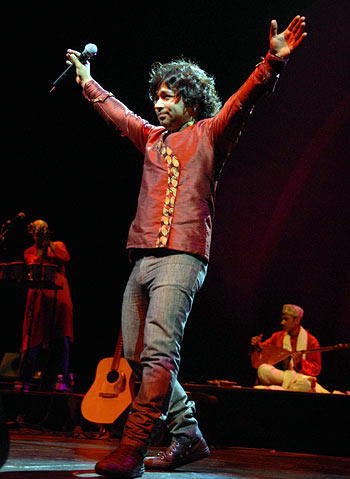
What are some of the special aspects of your albums?
The words, for instance. I try to convey something philosophical even in my lighter songs. Listen to Tauba Tauba. It is a fun song but it also carries a pithy message about greed and worldliness. And then the musical instruments we use. We go out looking for instruments that are not commonly used. So you'll find sounds coming out from the familiar and unfamiliar instruments.
How old were you when you began performing?I was four when I performed with my father in public.
Was your father a musician?
Not in the traditional sense. Singing was more of a hobby to him. But he had a masterly knowledge of folk music. He gave me a lot of encouragement but I wasn't sure if I could succeed as a singer and musician while growing up. I went into export business of handicrafts which did very well for two years and then collapsed.
How did you keep your faith in singing and composing?
It was mainly because of my older brother, Mahesh and younger sister, Gudiya. They kept telling me that I should pursue a career in music. They would say, 'You sing two lines and make people weep with joy. You can stir people in no time.' That is why I came to Mumbai from Delhi looking to launch my own album. Singing for films came later; it is more of a by-product of my own album and the huge success it has had across India.
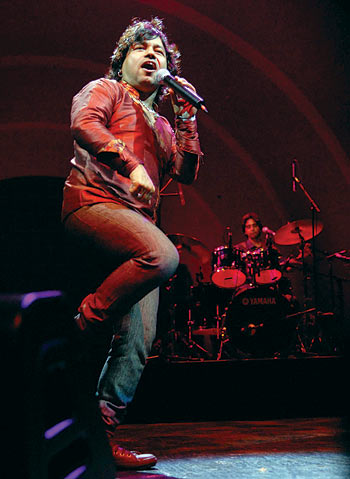
You have spoken at length about your father's influence on you.
He loved folk poetry. And there was always music and poetry at home. He introduced me to the poetry and wisdom of what we call Nirgun or Sufi poets, the songs of Kabir, Bulleshah and others, at a very young age. I learnt to love words from him.
How has that influenced your own writing?
I have a keen ear for dialects and words used in a particular region. People collect a lot of precious material things. I am more interested in collecting words, especially the words that are variation of standard words. Like the word chandana (moonlight) my grandfather used to say so often.
You have also caught the attention of some of the top composers in Hindi film industry.
I have been lucky to work with some of the most innovative composers of our time: A R Rahman, Vishal Bhardwaj, Salim-Sulaiman, Vishal-Shekhar...
Your song Fatak in Kaminey -- sung with Sukhvinder Singh -- is getting a lot of popularity.
It was a privilege to work with Vishal Bhardwaj. When he told me he wanted me for this song, I was overjoyed because I am a great admirer of Vishalji. He is one of the handful composers in Mumbai, who are changing the face of music. They are highly innovative and productive composers.
What was the other reason that made you happy about working with Vishal Bhardwaj?
Sentimental thoughts. Both of us were born in Meerut. I did not grow up in that city, for my family moved to Delhi. But we have surely taken something from that soil and cultural tradition.
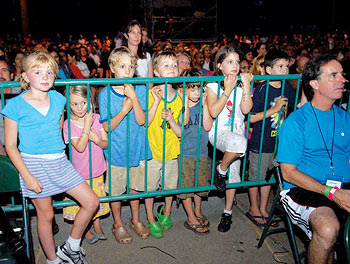
Were there any detractors?
Some people in the film industry used to say that given my unique voice not many actors could lip sync to my songs. But that factor has worked out in my favour.
In what way?
I get to sing a song or two in a film and that song becomes something very special, even an event. My voice is heard in the films of Amitabh Bachchan, Aamir Khan, Shah Rukh Khan and many others. These songs stand out.
What is your own experience in composing for films?
We (including his partners Naresh and Paresh) come up with a variety of tunes, be it Chandni Chowk to China or Dasvidaniya. We make sure that we are not overworking ourselves. Discipline is important to us. We don't want to become a part of the rat race.
What do you make of old timers, including a few composers, who denounce today's music?
I ask how can you ignore the wide variety of music you hear today? How can you not enjoy the work of some of our finest composers whose music may last for decades? Of course there is a lot of bad music but there was bad music in the past too. I do not believe that just because someone is 80, the person is full of wisdom. Sometimes a 10-year-old person can have more wisdom than a person in the 70s or 80s.